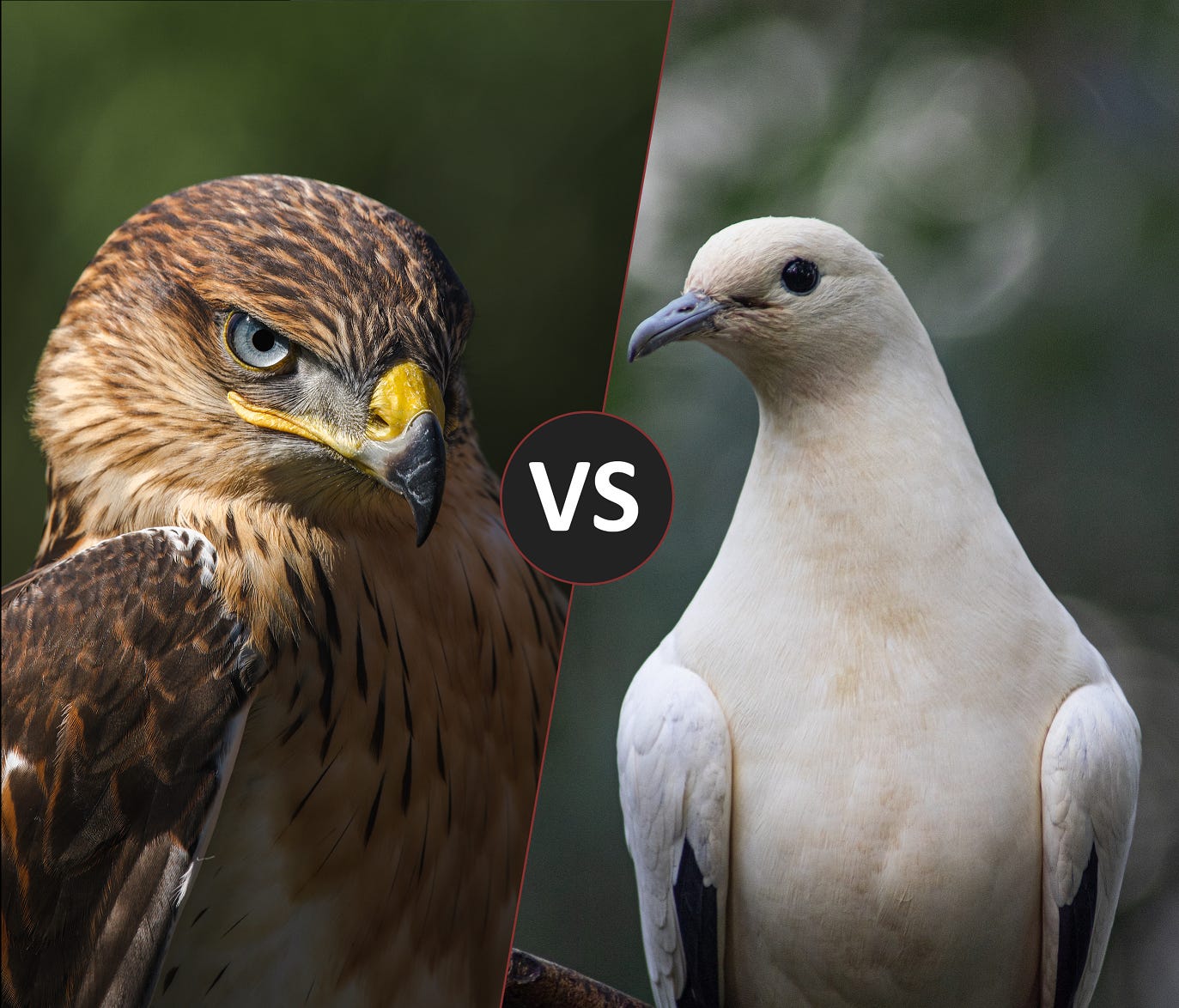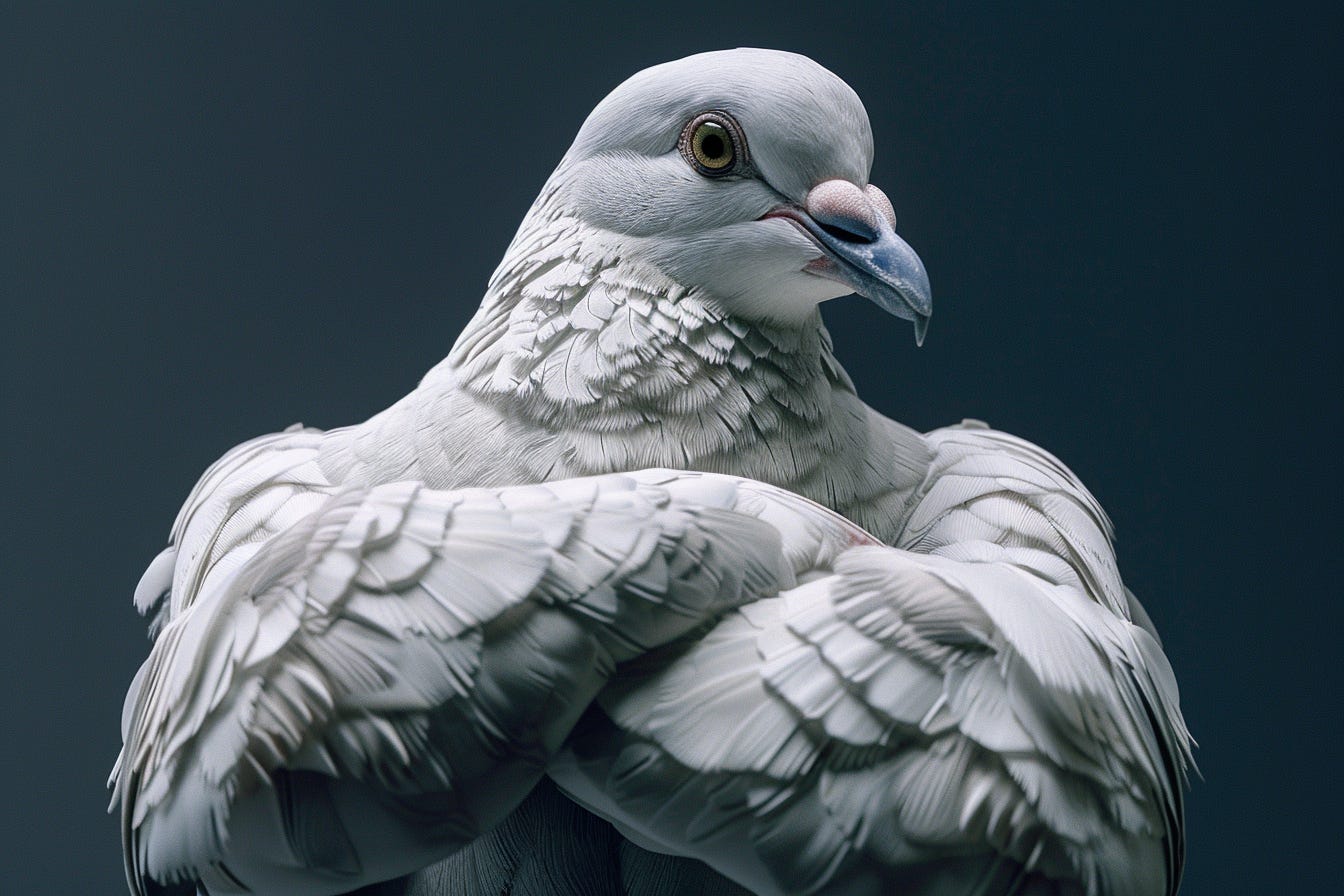Competitive Hawk vs. Cooperative Dove: Which Type of Leader Are You?
Evolutionary Stable Strategy • Why it's dangerous to only be a hawk or a dove • When to be a hawk vs. dove

Does someone with a more competitive personality or a more cooperative personality have more success when leading a business, when all other traits are equal?
That was the question cross-posted by u/2fy54gh6 onto multiple subreddits on leadership, management, entrepreneurship, psychology (1, 2), and Machiavellianism. We felt compelled to respond.
The short (lazy) answer
It depends ¯\_(ツ)_/¯
Just like it’s sometimes wiser to follow conventional wisdom and sometimes better to think like a contrarian, it’s sometimes better to be maximally competitive and sometimes better to be maximally cooperative.
The long (thoughtful) answer
The redditor asked a great question, but a misleading one. The phrasing implies that there’s a spectrum of "maximally cooperative" and "maximally competitive," and one side is superior to the other. This is an example of static thinking and can get you into trouble; what is true in one narrow set of circumstances will cease to be true once conditions change.
Let’s stay out of trouble with dynamic thinking. As masters of our own fates, we can change our behavior depending on environmental factors. We are Homo sapiens, not Homo economicus.
Hawks of Raptoria vs. Doves of Pigeonopolis
We’ll call someone who is mostly competitive a “hawk” and someone who is mostly cooperative a “dove.”
Let’s visit Raptoria, an ecosystem in Leadership Land completely infested with hawks. Everyone is maximally competitive and jealously guards their territories. They’ll spend most of their time hoarding power, backstabbing each other, brown-nosing and name-dropping to curry favor, and engaging in all kinds of petty rivalries that sometimes escalate into full-blown civil wars.
So basically, much of Leadership Land’s Middle Management Foothills.
Put too many hawks in an ecosystem, and they’ll be too busy competing for limited resources to think about the greater good. When the leaders of an organization are stuck in the Straits of Conflicting Interest, it creates an opening for a dove (someone cooperative) to come in. The dove must forcibly tame or win over the warlords, unite the warring tribes, and align everyone’s interests with the organization’s. The dove fills a niche that the hawks were too busy infighting to notice.
Next, let’s go to Pigeonopolis, another ecosystem in Leadership Land completely inhabited by doves. The doves are so self-effacing and self-sacrificing that no one takes credit for achievements. Superficially, Pigeonopolis is a pleasant and fluffy place, full of cooing doves with olive branches in their beaks. Beneath the surface, however:
Some doves are clearly more productive or talented than others, but they’re paid the same as everyone else. A culture of toxic positivity discourages the high performers from expressing their irritation to maintain the illusion of harmony.
All decisions are made by consensus, rendering the organization slow, indecisive, and vulnerable to fleet-footed competitors.
The whole place is like a less-extreme version of Harrison Bergeron because the leadership is weak, everyone is superficially equal, and no one wants to make anyone else feel inferior.
In other words, when an organization is plagued by excessive cooperation, it begins sinking into the sandy Desert of Good Intentions. If a hawk flew from Raptoria and invaded Pigeonopolis, the hawk would instantly make a killing by seizing a greater share of the pie.
In reality, no organization falls on either extreme. A hawkish organization would grow weak from infighting, leaving openings for the doves to move in. The hawks evicted from their eyries would invade dovish organizations and take them by storm. In most organizations, the proportion of hawks vs. doves will hover around an equilibrium point. This is an illustration of an “Evolutionarily Stable Strategy.”
Next, let’s turn our attention toward inter-organizational conflict.
Are you playing a zero-sum game?
Zero-sum games can be summarized as “one person’s loss is another person’s gain.” Examples include college admissions, hiring, promotions, dating, and market share - any situation where many people/organizations are vying to occupy a limited number of slots. A customer who is buying from you cannot spend those same shekels at a competitor: your gain is a competitor’s loss.
True zero-sum: Many businesses in Leadership Land engage in true zero-sum games. These business typically sell low-margin products at high volume. Typical examples include airlines, restaurants, or commodities (coal, iron, bushels of wheat). One company’s products are virtually indistinguishable from another company’s.
In this kind of business, you will only survive by being ruthlessly, bare-knuckled, bloodlustily competitive. Give your competitors an inch, and they’ll take a mile. Being excessively nice to your employees means your customers go somewhere else, since customers usually care more about how much they're paying you than how much you pay your employees. In this cutthroat environment, it’s often better to be a hawk - even a psychopathic hawk with a bazooka in each talon.Quasi-monopolies. Now consider businesses that own a quasi-monopoly on some product. They can afford to not spend every hour, every day trying to seize a bigger slice of the pie from competitors. They can afford to be mildly cooperative internally, treat their employees well, and conduct research and development. In this kind of environment, doves are rewarded for being cooperative and collaborative because it expands the size of the overall pie. Externally, it still pays to be hawkish against your competitors. Some examples:
Google, which has a quasi-monopoly in online search, and a duopoly with Meta in online advertising
Apple, which owns a quasi-monopoly in premium consumer electronics
Amazon (Web Services, not the retailer), whose data-centers form the backbone of the Internet
Microsoft, which dominates the business operating system and office-productivity space
Pfizer, Moderna, Eli Lilly, etc. each of which owns de facto monopolies on patented drugs, although the monopolies are limited in term.
True monopolies and non-zero sum games. Now consider true monopolies, like governments. Governments own a monopoly on taxation and violence, and it pays for them to be maximally dovish with their citizens1. Even in cases where governments regulate citizens under threat of force, it’s (supposedly) done for the greater good, with the government acting as benevolent dictator and forcing cooperation between opposing sides – like a very muscular dove.
Is your industry growing or shrinking?
If your organization is a small fish in a big pond, it pays to be a cooperative dove. There is room to grow, to create alliances and cross-promote, to rise alongside a cohort of other leaders/businesses. Everyone benefits by swapping advice and referrals in a system of reciprocity. Examples include law firms and small-time content creators (ahem) referring clients or readers/viewers to each other. There’s more demand than supply, so it pays to send your excess demand to a competitor with the tacit expectation that they’d do the same for you. In general, doves thrive in growing industries, or in abundant environments where there’s more than enough to go around.
On the flip side: if your business has a substantial market share, then it pays to be a hawk. Sending customers to someone else hurts your profits, while gaining you almost nothing (all downside, very little upside). In this environment, you benefit by throwing your weight around. You will earn more money and power by swallowing upstart competitors that may one day threaten your business. If someone won’t sell to you, you can wear down the holdouts in a war of attrition that they can’t afford. It pays to fight dirty, like SLAPPing a smaller competitor, or Starbucks paying a landlord huge shekels to buy out a competing coffee shop’s commercial lease (figuratively pulling the rug out from under their feet). In general, hawks thrive in mature (slow-growing) or shrinking industries. That is, hawks tend to do better in environments of scarcity.
Friends, enemies, and frenemies
There’s an old Mormon quote that’s often mis-attributed to Maya Angelou:
They may forget what you said and did, but they will never forget how you made them feel.
If you victimize someone with your hawkish ways, you’ll have to watch your back for the rest of your career. If you take someone under your dovish wing during their time of need, they’ll be indebted to you for life.
Or will they?
Some people will overcome their desire for revenge. Some will speak the words of gratitude to your face while internally resenting their debt to you. When you run into trouble, you might be surprised to discover that those who help you are not those you helped in the past. And if you show magnanimity to a former enemy by hiring them instead of crushing them, you might create a loyal ally – someone with much to prove.
Puts a new spin on “keep your friends close, and your enemies closer,” eh?
Rough Guidelines: When to Be a Hawk vs. Dove
There is no single answer for “is it better to be competitive or cooperative in business?” It depends entirely on your environment.
Within an organization: You need a fine balance between hawks who create internal conflict and doves who create toxic positivity with the best of intentions.
Between organizations: Dove generally thrive in monopolistic, low-competition environments. Hawks generally thrive in testosterrific, winner-take-all contests.
Industry dynamics: Hawks usually thrive when the environment is shrinking and resources are scarce. Doves usually thrive when the environment is expanding and there’s plenty to go around.
Interpersonal conduct: depends entirely on the type of person you’re dealing with. Individual humans are too complex and fickle to label as “hawk” or “dove,” so this is where the analogy breaks down.
During peacetime, anyway. When governments wage war, hawkishness (chest-pounding, invasions, weapons development) and dovishness (diplomacy) both have their place.


typo?? We’ll call someone who is mostly competitive a “hawk” and someone who is mostly competitive a “dove.”